







Serena Williams: Dressed to Thrill
Serena Williams is the new look of tennis -- and that fact
has caused some jaws to drop. Reuters reports that the
champ and the younger sister of Venus Williams, 22 --
caused quite a stir Monday at the opening of the U.S. Open
in Forest Hills, N.Y. There were no tennis whites for
Williams, 20, who made her way onto Arthur Ashe court in a
short-legged, all-in-one, black leather-look, skin-tight
outfit with little prom-dress touches: pink wristbands and
a diamond tiara. Serena told Reuters that sister Venus liked
her look, and Venus is the family critic as well as a
design student. "She really liked it," said Serena. "She
said it was a great outfit. It is really fun and really
exciting and very sexy ... I mean she just basically
described me." The fun, exciting and sexy player also
acknowledged that her outfit may not be to everyone's
liking: "This is a cat suit, it's made of Lycra and it's
supposed to have the illusion of looking a little bit like
leather from a distance It sticks to the body, it really
sticks to what type of shape you have. "If you don't have
a decent shape this isn't the best outfit to have." Serena
took a 6-2, 6-3 first-round victory over fellow American
Corina Morariu.
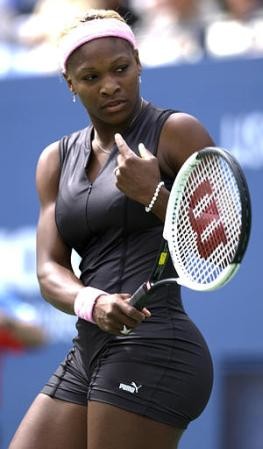
Serena Williams Dares to Bare at U.S. Open
By Jenny Bailly
New York August 27, 2002
Serena Williams' $29,000 Harry Winston tennis bracelet isn't the only thing attracting attention for the young athlete at the U.S. Open this week. Yesterday the Wimbledon champ turned heads when she stepped on the court wearing a short-legged, one-piece ensemble that appeared to be fashioned from black leather.
Turns out that the catsuit look is in fact fashioned from Lycra, but Serena does admit that, "it's supposed to have the illusion of looking a little bit like leather from a distance."
Of course, the days of wearing tennis whites are long gone, thanks to fashion-forward athletes like Serena, her sister Venus and Anna Kournikova, but this dominatrix-style catsuit was still a shocker for many spectators. Serena accessorized with the "Twelve to Twilight" diamond bracelet bestowed on her by the house of Harry Winston last week, as well as a diamond tiara and hot pink wristbands.
Both Williams sisters have made almost as many headlines for their courtside style as they have for their athletic prowess. The young women attend the Art Institute of Fort Lauderdale, and often design their own clothes.
In January, Venus was criticized by the press down under for some of the ensembles she chose to wear at the Australian Open. "Since when did spaghetti straps belong on the tennis court?" asked Melbourne's Sunday Herald Sun. "The statuesque Venus is probably giving men a thrill bouncing between the white lines, but women everywhere shudder in knowing horror at the skimpiness of the outfit." The 21-year-old bit back, telling reporters that some of her peers on the women's tour could be more mindful of their appearance. "I try not to judge anyone, and the only thing I can get critical about is fashion, and you know, if you're not wearing the right thing, it can be detrimental," she said.
Although Venus is the one who inked a three-year deal with Wilsons Leather in December 2000 (her collection for the Minneapolis-based retailer launched last fall), her sister is the first to bring the leather look to the court. Serena acknowledges that the style isn't for everyone though: She told reporters Monday, "If you don't have a decent shape, this isn't the best outfit to have."



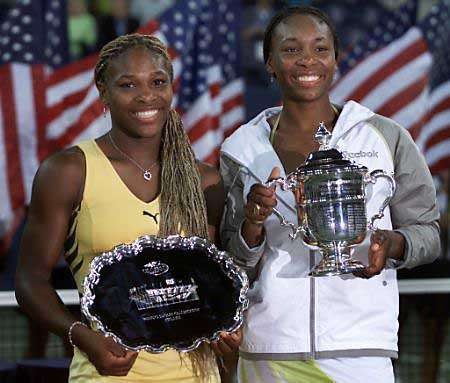
From LATIMES.com: Williams Sisters Can Serve as Big Inspiration to Others
Diane Pucin August 28 2002
NEW YORK -- Venus Williams was uncomfortable with the questions about Althea Gibson.
"I've never actually met her," Williams said. "I've only seen a couple of plays of hers on video. She seemed very, very smooth and elegant as a player."
Williams was also uncomfortable addressing the idea that she and her sister, Serena, should be Pied Piper leaders of young African-American girls into a sport that has not always welcomed players of their race.
"I don't think the next Czechoslovakian player is vying to make sure that other Czechs are in the game," Venus said. "It's the same for me. Even though I'm African American, I'm living my life every day, basically as a person."
The subject of Gibson was brought up because Gibson, the first African American to win Wimbledon and U.S. Open titles, was honored Tuesday night at the Open, a celebration of her recent 75th birthday. Gibson, who lives in New Jersey, is physically frail but mentally strong.
She watches every stroke of women's tournaments with interest, says her friend, Fran Gray, but does not feel physically capable of traveling to the tournament.
While Gibson was winning Grand Slam titles in the late 1950s, there was no influx of minority children into the sport.
"That's not a surprise," says Gray, the coordinator of the Althea Gibson Foundation. "We couldn't see Althea on television. We didn't see her highlights on sports shows.
"And there were no courts or rackets or balls in the inner cities. There were no coaches. There was no support."
While the inner cities aren't overflowing with tennis courts, they do exist. So do programs and coaching for kids of every race.
But there is no certainty that tennis will soon be a multi-racial game.
Venus made a good point. She and Serena took the same path as other tennis stars but it is not a path that is a blueprint for African Americans everywhere.
She and Serena became champions because their parents, Richard and Oracene, made a conscious decision to make their two youngest daughters into tennis stars. Richard single mindedly shepherded his girls into the sport because, he has said, there was big money to be made.
Just as Peter Graf gave Steffi a sawed-off racket, just as Karolj Seles made tennis games for young Monica, just as Gloria Connors changed her life so that Jimmy could be a star, Richard Williams has managed the careers of his children.
The video we saw of Gibson on Tuesday night was grainy and in black and white. It featured a tall, strong African American woman who stood head and shoulders above her opponents, who moved with a dancer's ease across a tennis court and who hit the ball with a fastballer's firepower.
Earlier Tuesday, Venus took 50 minutes to beat Mirjana Lucic, 6-0, 6-0. Williams is a tall, strong African American woman who stands head and shoulders above her opponents, who moves with a dancer's ease across a tennis court, who hits the ball with a fastballer's firepower.
Venus has won four Grand Slam titles and her sister three. They have been paid millions of dollars from clothing and shoe companies. They represent various companies. They have moved tennis into a new realm of athletic performance.
They are young and hip and cause a sensation with the clothes they wear, with the powerful confidence of their strokes, with their personalities, with their words.
Their drawing power does not attract other African American women to the game. Their drawing power attracts other young women.
Gibson never expected to be a racial trailblazer, her friend Gray says. Gibson hoped that by her success in sports she would be able to convey a message about education, to advertise that she, a high school dropout, earned a college degree.
Chanda Rubin, another African American female tennis player, said that if Gibson were playing today, "she would be rich. She'd be like Stan Smith. She would have a shoe named after her and she wouldn't have to work another day in her life."
"Althea was a pioneer," Rubin said. "The Williamses have followed in her footsteps as other black girls will follow in theirs. Kids need access, opportunity, discipline, desire, good coaching, good equipment. But it does start with a dream and that dream often starts by seeing someone who looks like you out there succeeding."
A dream will often remain a dream, though, unless the dreamer sees a legitimate way to fulfillment.
Lots of African American, Asian, Caucasian and Latino young men and women would love to be Tiger Woods.
But without an Earl Woods, a totally focused father, following in Tiger's footsteps simply won't happen.
Just because other girls and boys in Compton, where the Williams sisters started playing tennis, might want to become Venus and Serena, doesn't mean they will.
Not without a Richard and Oracene to push.
The way tennis is run in this country, as a sport of individuals who must find their own way to the tennis court, to the tennis lessons, to the junior tournaments, who must either have the money to do all this or a singular parent to force all this, Venus and Serena will be no more racial trailblazers than Althea Gibson was.
Which isn't a good thing or a bad thing. It's just the way it is.
Diane Pucin can be reached at diane.pucin@latimes.com.




From Miami Herald: Serena Williams wears risqué catsuit again, wins big again
by Darren Everson
New York Daily News
Wednesday, August 29, 2002
NEW YOKR--She came back for more on Wednesday. Back to demolish another overmatched opponent. Back to wear that super-tight, ultra-risque black bodysuit, or cat suit, as some have taken to calling it.
Everyone is still talking about it. Someone asked father-to-be Pete Sampras whether he'd let a daughter of his wear something like that.
Sampras had just said he'll never be an oppressive, psycho tennis dad. "I might draw the line there," though, he said.
Everyone else can draw the lines wherever they wish. Unlike Tommy Haas, whom officials prevented from playing in a sleeveless shirt on Wednesday, no one is stopping Serena Williams from wearing what she wants.
Or doing whatever she likes on the court.
The top-seeded Williams whizzed through the second round of the U.S. Open on Wednesday, winning, 6-0, 6-1, in 40 minutes over 16-year-old Dinara Safina, Marat Safin's younger sister.
Safina has some promise, but there are only two sisters who truly have a chance here.
Venus Williams is the defending Open champion, but Serena is unquestionably the center of attention, because of her stature as the world's top-ranked player and her style. Even if it's more because of the latter than the former, Serena said she doesn't mind.
"Maybe more people want to watch tennis," she said of the attention her outfit is drawing. "Maybe more people look."
Tennis-wise, there wasn't much to watch in the afternoon match at Arthur Ashe Stadium. This was Williams' 16th straight Grand Slam match victory, and it was as quick as they get.
Safina had two winners and no break points against Williams' serve the entire match. The only question the entire time was whether Williams would win 0 and 0, something she said she's never done in her professional career.
There were two highlights for Safina: preventing Williams from shutting her out and serving an ace. Safina reacted like you'd figure a 16-year-old would on such a big stage.
"She was like, `Sorry!,' " Williams said. "Maybe if I were 16 and I had aced Steffi Graf or Monica Seles, I would've been completely overwhelmed also. I can totally understand."
Williams is a long way from such shyness and anonymity. After winning the French Open and Wimbledon this year, both over her sister in the final, Williams has become the biggest star here.
Despite how well she's playing, Serena said more than once that Venus has been outplaying her on the practice court this week.
"I'm a little further down than she is," Serena said. "I almost feel as if I shouldn't be practicing with her. I'm trying to get on her level."
In terms of popularity, though, Serena seems unmatched at the moment. She said there's little downside to all of the attention, other than losing a little personal freedom.
"I can't go anywhere," she said. "I haven't been able to go anywhere for a little while now. Every year I seem to get more popular. I'm pretty used to it.
"I look at it this way: I'd rather be at this end of the stick than the other end, being very successful than not winning at all, not being successful, not having any success in my life. That's how I try to look at it."



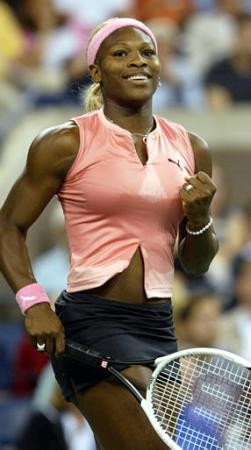

From SUNTIMES.com: Venus, Serena need real challengers
by Greg Couch, Sun-Times columnist
September 4, 2002
NEW YORK--Her name is Simonya Popova, a 17-year-old, talented, gorgeous, leggy, blond tennis player about to join the tour. And she is just what the women's tour needs: Someone to overcome the Williams sisters on the court while outdoing Anna Kournikova on the runway.
''Not long ago, a half-dozen players were credible candidates to win major titles,'' Sports Illustrated wrote in a five-page story about Popova this week. ''Today there are only two: Venus and Serena Williams. ... As their tennis has ascended to new heights, the rest of the field has vaporized.''
True, but one problem: It was a hoax. Sports Illustrated made it up. There is no Popova, so the buzz Tuesday at the U.S. Open was from the women's tour, upset that SI seemed to be claiming that the game needs saving.
In truth, the game could use Popova or someone, anyone, to step up to the Williams sisters with a little courage. The Williams sisters are the best thing to happen to tennis in years, but it wouldn't hurt if they weren't on an island.
The turning point may have arrived Tuesday, when Chanda Rubin played Venus. Venus won 6-2, 4-6, 7-5, and afterward seemed to ridicule Rubin.
''I was making so many unforced errors,'' Williams said. ''Sometimes on those slow serves, I just couldn't ... they were so slow.''
She laughed. But Rubin was five points from winning, and she believed. Really believed.
''It's pretty sad if you step out on to the court and you don't feel you can beat the opponent,'' Rubin said. ''Everybody has weaknesses. Everybody can be beaten.''
This is real confidence, not the petty denials of the Williams' superiority that we've seen the past few years. It has taken forever. But the women's tennis tour has completed the stages of Williams-sisters grief. Denial, anger, depression. Now, acceptance. Finally.
The other players are now healthy enough mentally to begin the climb toward Venus and Serena.
''They are definitely at a level above everyone else,'' Lindsay Davenport said. ''If anyone else really wants to get into that mix and be talked about in the same breath as those two, you have to raise the level of your game. And you have to do it at the big moments.''
The Williams sisters have moved the game forward, and now the others can try to catch up. In the end, no one will. But at least now they are free to try.
It took Serena 14 minutes to deflate 11th-seeded Daniela Hantuchova on Tuesday. Hantuchova won the first game. But by the eighth minute, Williams was grunting and Hantuchova wobbling. And in the 14th minute, Hantuchova hit a 100-mph serve, Williams stepped around it and smacked a forehand winner.
Hantuchova's shoulders slumped. She sighed. She was done. Serena went on to win 6-2, 6-2--in 55 minutes.
Venus and Serena are on the verge of meeting each other in the final for the fourth time in the last five major championships. Talk today will be that the winner of the match between Amelie Mauresmo and Jennifer Capriati might have a real chance to beat Venus.
I like Popova's chances better.
''There's a lot of other things,'' Capriati said, ''that make this game besides [the Williams sisters].''
Well, that's still to be seen.
But maybe. Maybe soon.



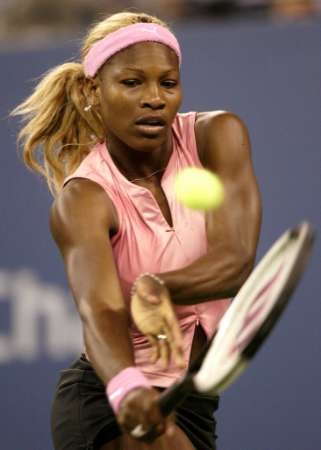
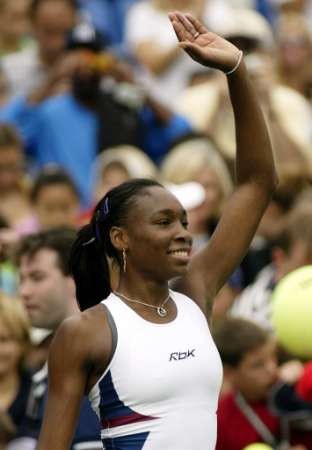
From USAToday.com: Venus, Mauresmo earns spots in semifinals; Agassi, Hewitt advance
NEW YORK (AP) — Venus Williams reduced her U.S. Open quarterfinal against Monica Seles to something akin to an instructional video. Want to see aces at more than 110 mph? Check. Some forehand winners? OK. Sure-handed volleying? There you go. The two-time defending champion simply had too much in every department and beat Seles 6-2, 6-3 Wednesday night to join younger sister Serena in the semifinals, putting each one victory away from a third consecutive all-Williams Grand Slam title match.
Venus, trying to become the first woman to win three straight U.S. Opens since Chris Evert took four in a row from 1975-78, plays 10th-seeded Amelie Mauresmo next. Mauresmo came back to beat Jennifer Capriati 4-6, 7-6 (7-5), 6-3.
The other women's semifinal will have top-seeded Serena — who lost to Venus in the 2001 Open final and beat her for the titles at the French Open and Wimbledon this year — against Lindsay Davenport. They won Tuesday.
Defending men's champion Lleyton Hewitt and two-time Open winner Andre Agassi set up a semifinal showdown with victories Wednesday. Hewitt beat No. 20 Younes El Aynaoui of Morocco 6-1, 7-6 (8-6), 4-6, 6-2, while Agassi fought back to defeat No. 32 Max Mirnyi of Belarus 6-7 (7-5), 6-3, 7-5, 6-3 at night to get to the Open semis for the eighth time.
Agassi-Hewitt will feature the game's two best returners of serve and the last two baseliners to win Wimbledon, Agassi in 1992, Hewitt in July. Hewitt has won their last three meetings, including two on hard courts this year.
"He's difficult for everybody. He's been No. 1 in the world now for almost a full year," Agassi said. "He makes you play a great match to beat him. I've just got to come out there and do it."
It's another intergenerational duel between a player in his 30s and one in his 20s, just like Pete Sampras vs. Andy Roddick in a quarterfinal Thursday.
At 32, Agassi is trying to become the oldest Open champion since 35-year-old Ken Rosewall in 1970.
First things first, though. Agassi had to get past Mirnyi, known as The Beast for his 6-foot-5 frame and fierce serve, which produced 19 aces. The tiebreaker was the first set Agassi had dropped in the tournament.
"He can use his size to force you to do something special on any given point," Agassi said. "You don't think about losing or winning, a set up or a set down. You think about what do I need to do here to get my teeth deeper into this match."
Two hours into it came a game that had a bit of everything — seven deuces, four break points, two double faults, two brilliant passing shots by Agassi, and a game-ending ace at 124 mph. There was also this unusual scene: A spectator shrieked just as Mirnyi served, he faulted, and Agassi allowed him to take another first serve. Mirnyi put his thumb to his nose, opened his hand, and waggled his fingers in the direction of the yell. He then faulted again.
While Mirnyi did eventually hold serve there, the damage was done: Agassi had worn him down. Agassi broke Mirnyi next time to go ahead 6-5 and then served out the set at love. One more break, to 3-2 in the fourth set with a forehand winner, put Agassi in complete control.
Venus set the tone against Seles by breaking serve in the opening game with a backhand drop shot as her father, Richard, took photos from the stands. Venus finished with 23 winners to six for Seles and won the point on 17 of 20 trips to the net.
"I don't think Monica played her best today. I know she was expecting to play better," Venus said. "Being so windy out here made it more difficult."
So did having to play Venus, who dropped just one point on her serve in the first set, and a total of seven in the entire match. Venus faced just one break point, at 4-3 in the second set, and quickly erased it by drilling an ace at 112 mph.
"She just served too well," Seles said. "I couldn't read it at all."
It was as though Venus wanted to show everyone that her three-setter in the fourth round Tuesday against Chanda Rubin was an aberration.
"I was trying to escape that match," Venus said. "I don't like to play like that, especially in the Grand Slams, especially in the later rounds."
Twenty minutes after her victory over Rubin, Venus was out on a practice court with her father, working on some things. Clearly, the fine-tuning paid off.
"The balls were coming back very fast," said Seles, who has won nine major titles and still is ranked No. 5. But she's now 1-8 against Venus and no longer has the court coverage to keep up with either Williams.
"It's really satisfying to know I've been able to work so hard to get to this level, where I can play so well against a player like her," Venus said.
Neither Williams reveals an iota of self-doubt on court, a quality that has helped them overtake Capriati to become 1-2 in the rankings.
Capriati blamed herself for the loss to Mauresmo.
"It hurts. Definitely hurts. Just a lot of expectation, a lot of pressure put on myself," Capriati said, her eyes red. "There's a fine line, there's a balance. That's not good either, to just want it so bad."
She used the words "nervous" and "tight" to describe her play. Later, responding to a question, she added, "Well, I think 'getting tight' is basically saying you choked."
Now, like at Wimbledon, Capriati is shut out of a Grand Slam's semifinals.
"This has kind of been a new pressure that I've felt — coming off being No. 1 and having such a great run," she said. "Human beings are the only ones that go over and over and do the same mistakes over and over. We never learn."
Copyright 2002 The Associated Press. All rights reserved. This material may not be published, broadcast, rewritten or redistributed.





From LATIMES.com: 2 in Way of All-Williams Open Final
by Hall Bock, AP Sports Writer
12:56 PM PDT, September 5, 2002
NEW YORK -- All that stands in the way of another all-Williams final at the U.S. Open are Lindsay Davenport, who is making a remarkable recovery from knee surgery, and Amelie Mauresmo, who has made it this far in a Grand Slam tournament just twice before.
Sisters Venus and Serena Williams are one step away from their fourth championship meeting in the last five majors. On Friday, Davenport and Mauresmo each will get a chance to ruin those plans in the semifinals. And their prospects are not great.
Davenport, who plays Serena, has lost seven of their nine previous meetings, including two at the U.S. Open. Mauresmo has lost all four of her matches against Venus.
When the sisters reached the U.S. Open final a year ago, it was the first time since 1884 that siblings had played for a Grand Slam championship. Venus won her second straight Open that night, and since then there have been two more sister showdowns, with Serena winning the French Open and Wimbledon.
Both sisters have put on a high-power display at the U.S. Open. Through five matches, Venus has regularly served at over 120 mph, and Serena has lost just 14 games. The only speed bump came when Venus dropped a set to Chanda Rubin, a temporary interruption in the sisters' dominance of this tournament.
Davenport is playing in her first Grand Slam of the year following surgery on her right knee in January. She did not get back to the courts until the Fed Cup in July and had limited preparation for this demanding tournament.
She's amazed that she's gotten this far at the Open after a difficult rehabilitation that had her on crutches for several weeks.
"I really could have never said this would happen, especially after January and February," she said. "It was just impossible, in my mind. It's an amazing feeling. I really think this is one of my better achievements, just to be able to come back from everything this year and get to the semis of a Slam.
"I can't even describe it. For some reason here, I've started to reflect on things I've gone through and I don't know why. I mean, I just wanted to play here so badly and do well. I'm so happy that I was able to do it so far."
Davenport reached the finals of warm-up tournaments at Los Angeles and New Haven, losing to Rubin and Venus. She also lost to Venus in the semifinals in San Diego. She's looking forward to playing Serena this time, but she understands the challenge the Williams sisters present for the rest of the field.
"They are definitely at a level above everyone else," Davenport said. "Certainly, it's a huge challenge. If I lose, I could walk away with that. I really don't want to. I'm just going to go out there and play."
Serena knows she has dominated Davenport. She remembers best, however, losing to her at this tournament in 2000.
"It haunts me still," Serena said. "I was the defending champion that year. Lindsay played very, very well that night. There was nothing I could do to beat her."
They met again at the Open last year, with Serena winning a difficult three-setter. "I remember I had match point," Serena said. "She goes and hits this ball on the line. It was for a winner."
Serena enjoys facing Davenport. "We play the same style of game," she said. "I actually like playing Lindsay. I can't wait. Win, lose or draw, I'm going to have fun."
Mauresmo reached the final of the 1999 Australian Open, and lost to Serena in the semifinals at Wimbledon this summer. She thinks it would be a good thing for tennis to stop the Williams juggernaut.
"People are maybe going to get bored of seeing always the same final," she said. "To me, it gets a little irritating because you want to go out there and beat those guys."
Venus zoomed into the semis by quickly eliminating former champion Monica Seles. There was no indication that she sees Mauresmo as a problem.
"I'm really not sure what her career will be," Venus said. "I know what mine can be, and that's more or less what I focus on."
The sisters are also what their father, Richard, focuses on as he prowls around center court. He schmoozes with fans and takes pictures of his daughters, seemingly unconcerned about whether they'll win. Only because that has become so routine.



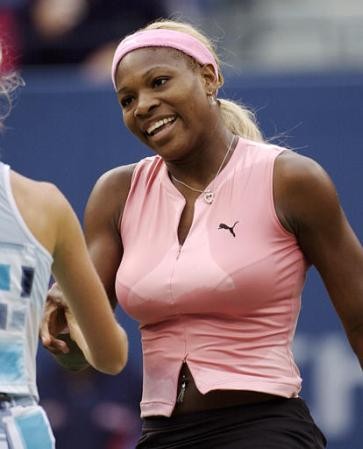
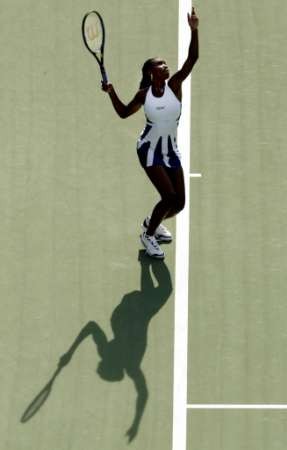
From LATIMES.com:Guess Who's Back in U.S. Open Final
by LISA DILLMAN, TIMES STAFF WRITER
September 7, 2002
NEW YORK -- Conventional wisdom held for months that Jennifer Capriati was the only one who could realistically slow the runaway success of sisters Venus and Serena Williams.
Instead of getting ready to stop the sisters, Capriati, eliminated in the U.S. Open quarterfinals, was dancing at a club, Serafina, at a weekly Candyland party, landing in the tabloids, having stripped down to her bra, cigarette in hand.
Those with more conventional weapons in hand--a racket--fared slightly better at the Open on Friday, but, by nightfall, a certain sameness settled in over the National Tennis Center. Tonight will be another all-Williams final, the fourth in the last five Grand Slams, and a repeat of last year's glitzy meeting in prime time.
Two-time defending champion and No. 2-seeded Venus had more difficulty, defeating No. 10 Amelie Mauresmo of France, 6-3, 5-7, 6-4, in 1 hour 58 minutes. She had three aces and double-faulted 10 times.
Her younger sister, No. 1 Serena, stalled in the second set, fighting off three set points, but finished strongly against No. 4 Lindsay Davenport, winning, 6-3, 7-5, in 1 hour 22 minutes. Serena, who served 13 aces, will be attempting to win her third consecutive Grand Slam title, which would equal Steffi Graf's accomplishment in 1996.
"Most amazing thing in sports almost," Davenport said. "Could you imagine Tiger Woods challenging a sibling to go head to head for all the majors? And in an individual sport, no less. They don't have teammates to help them along."
The sisters have been able to establish a sense of separateness. For all that, it was fascinating to watch how each of them dealt with adversity on the court in relatively similar fashion in the semifinals.
Example No. 1: Venus, suffering from a blister on her right hand, found herself in a tight third set against an inspired Mauresmo. Serving for the match at 5-4, Williams fell behind, 0-40. She equalized by hitting a service winner of 116 mph and an ace of 114 mph, on two of the three points. For an exclamation mark, Williams reached match point by firing a service winner of 122 mph.
Example No. 2: Davenport slowly started to find her range, took a 5-2 lead in the second set and served for it at 5-3. Serena broke her at 15, and fought off three set points in the 10th game, trailing, 4-5. She saved one with an ace, another with a service winner and the third with a forehand winner.
"That was incredible playing at a tight time," Davenport said. "I wish I had been able to serve a little better of a game. She just came up with some big serves at the right time the whole match, and a really big game to just hang in there in the second set."
Venus simply looked weary and slightly annoyed when asked whether the sisters' domination was good for the sport.
"To be honest, I don't see why the question could be relevant why it would be bad for tennis," she said. "It's never been asked before. So I don't understand the question.
"It's just hard these days. When you win, there's a problem. When you lose, there's a problem. So what do you want me to do?"
She emphasized her point by smacking her hand on the podium. Venus was not the only puzzled member of the family. The crowd support was surprisingly in favor of Mauresmo. It would be like a crowd at Roland Garros cheering Mauresmo's double faults in a match against an American.
"I felt the crowd was getting behind me and maybe appreciated the way I was handling things," Mauresmo said. "I could feel that. It was great, actually, to play an American and feel the crowd is behind you. That's a pretty good effort."
Said Oracene Williams, the mother and coach of Venus and Serena: "You know what's wrong, you can surmise that for yourself. There were some people pulling for Venus. I give them a little benefit of the doubt. That's part of the game. It was worse in California [Indian Wells]."
At Indian Wells last year, the Williamses charged racism when the fans booed the family during Serena's final against Kim Clijsters. The fans were upset after Venus withdrew about five minutes before her semifinal with Serena because of an injury.
Oracene was asked whether Friday's reaction was a racial issue or one of gender.
"I've been thinking about that, I think that's it ... Is it because these are women, and women can't have power?" Oracene asked. "No matter what the race is, it's a problem in American society."
The sisters simply answer by winning matches at an astounding rate. They have combined to win seven of the last 11 Grand Slam titles. Venus won the U.S Open last year in straight sets against Serena, and Serena beat her in the French Open and Wimbledon finals this year, also in straight sets.
"I was overconfident going into that match," Serena said of the 2001 Open. "I was like, 'Oh, I'm playing well, beat Martina Hingis and Lindsay Davenport.' You know, I was overconfident, not focused enough.
"This year's totally different. Venus is playing great. She's been playing great all this summer. So I know she might maybe have a little bit of an edge going into this match, so I'm not overconfident at all."
*
Sibling Rivalry
Not once in the 20th century did siblings meet to decide a Grand Slam title. It's about to happen at a third consecutive major, and for the fourth time in five majors as Venus Williams plays Serena:
*--* YEAR TOURNAMENT WINNER 2002 U.S. Open Today 2002 Wimbledon Serena 2002 French Open Serena 2002 Australian Open Capriati* 2001 U.S. Open Serena
*--*
*Jennifer Capriati defeated Martina Hingis in the final; Venus lost to Monica Seles in the round of 16; Serena did not play because of ankle injury.



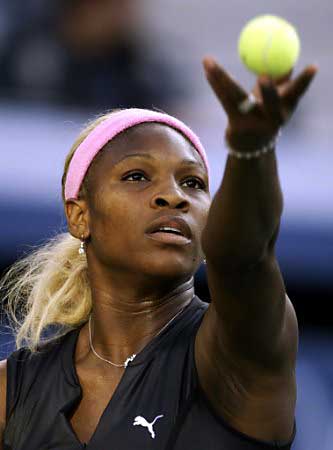
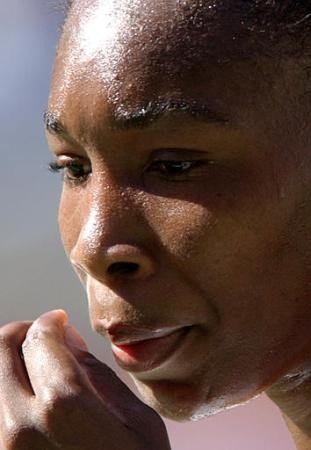
From Miami Herald.com:1-2 Punch: Williams sisters advance
by Michelle Kaufman
mkaufman@herald.com
September 7, 2002
NEW YORK - It's 1990 in Compton, Calif., and the Williams family's red 1978 Volkswagen bus is pulling into the parking lot at Lynnwood Park. The door opens and out pop two skinny sisters wearing corn rows and carrying tennis rackets. Their father comes around and pulls out a grocery cart filled with tennis balls.
They hit, and hit, and hit. Until the cart is empty.
Then they go home, grab a ball and stage fake Grand Slams until dusk. They throw dirt on the sidewalk to make it the French Open, grass cuttings for Wimbledon. The girls giggle as they invent exotic foreign-sounding names for themselves. Some of the most animated championships are for the U.S. Open title.
It's Friday evening in Flushing Meadows. Top-ranked Serena Williams and her older second-ranked sister, Venus, have just advanced to the U.S. Open final for the second year in a row with convincing victories over powerful semifinalists Lindsay Davenport and Amelie Mauresmo, who could do little but shrug afterward.
When they meet in tonight's prime-time final, it will be the third straight all-Williams Grand Slam final and fourth in five Slams. Serena beat Venus in the finals at Wimbledon and the French Open. Venus beat her younger sister in the 2001 U.S. Open final.
''Most amazing thing in sports, these sisters,'' said Davenport, after watching Serena Williams come back from 5-2 down in the second set to take five straight games and win 6-3, 7-5. ``Like I've said before, could you imagine Tiger Woods challenging a sibling to go head-to-head for all the majors? And in an individual sport, no less. They don't have teammates to help them along.''
Venus Williams was equally impressive Friday, fending off a hand blister and the strong and tricky Mauresmo 6-3, 5-7, 6-4. Mauresmo had three break points in the last game, but Williams saved herself with serves of 116 mph, 114 mph (an ace) and a 122 mph scorcher that barely touched Mauresmo's racket.
''So close,'' Mauresmo, the Frenchwoman, said, holding a tiny space between her index finger and her thumb.
Close, but no final for a non-Williams sister.
Again.
Davenport was also left frustrated after her match with Serena. Yes, it was satisfying to be so fit and play so well nine months after major knee surgery. And yes, Davenport said, there were signs the Williamses can be beaten. But in the end, it's the two sisters in the final. Those little skinny girls who staged those fake Slams have a monopoly on the game, and the rest of the world's top players have to figure out a way to catch up.
Davenport made a valiant effort after losing the first set 6-3. She went up 5-2 in the second, and had three set points, but Williams stayed alive by unleashing a 102-mph serve that kissed the inside of the service line. Davenport stood over the spot and shook her head in amazement.
''It's tough,'' Davenport said, shaking her head again. 'You hope to get in that position and if someone can come up with the goods at that point, you definitely have to shake your head and say, `That's too good.' ''
Davenport realized there were those who were rooting for her strictly because they wanted to see a new face in a final. But she didn't see her role that way.
''I don't feel I'm here to break up a Williams final,'' she said. ``I'm here to see if I can get to the finals.''
The answer right now is no.
And so, the Williams sisters were the ones flashing smiles for the cameras Friday night. Serena was decked in a sexy black outfit, pink rhinestone tiara framing her blonde hair. Venus, the more understated of the two, wore a faux-denim outfit.
They praised each other's game. They planned to dine together Friday night and hit together this morning, as always.
Someone asked whether being around her sister so much could be detrimental to the rivalry.
''It definitely doesn't serve as an impediment to my game, being around Venus,'' Serena said. ``We're family first, and that's what matters most. Because anything can happen. I don't want to get a bad rap with her and 10 years down the road, I need her help. That's not the way we do it. We realize that our love goes deeper than the tennis game.''
Venus said she was hoping it would be her younger sister across the net tonight.
''I want to see Serena do her personal best,'' the older sister said. ``I always root for her. Right now, she's playing really well. Her confidence is at an all-time high because she won two Grand Slams. I just want to go out there, do my best, and win this title from her.''
Told they were being compared to Tiger Woods, and raising the bar of their sport, Serena broke into a huge grin.
''That's a huge compliment for us,'' she said. ``We just started out as young kids playing tennis, practicing and practicing, promising to be the best and to at one point be at this stage in our lives.''
And then, she paused, and with a thick British accent said: ``It's shocking.''
Yes, it is.



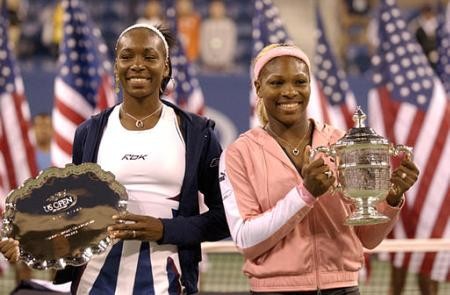
From New York Times Online: For Williams Sisters, Ambivalence Persists
by William C. Rhoden
September 7, 2002
How can anyone who watched Venus Williams dispatch Amélie Mauresmo and Serena Williams blast her way past Lindsay Davenport yesterday do anything but say amen?
The Williams sisters are the higher bar in women's tennis: fashion, style, power, precision. Still, there is this persistent ambivalence about the sisters.
Venus held off Mauresmo, 6-3, 5-7, 6-4, in the first United States Open semifinal; Serena rode a monster serve and beat Davenport, 6-3, 7-5. Now comes the challenge. They meet tonight for the fourth time in a Grand Slam final amid renewed complaints that they don't play exciting championship matches against each other.
Against the rest of the world, they take an aggressive, take-no-prisoners approach; against each other, critics say, they play polite tennis. The crux of the problem, if you can call it that, is love.
Someone asked Venus if tonight's championship match would be different, if she would be able to put aside "the sister stuff" and play Serena like any other opponent.
Venus asked: "Where's the problem?"
The reporter said that before, there almost seemed to be too much love. Venus arched her eyebrows. "Too much love?" she said, and left it at that.
The Williams sisters' dominance has caused a crisis, or at least angst, in tennis circles. Tennis fans are deeply divided. There are those who love excellence and want to see the No. 1 and 2 players face each other in the final round. Others feel great players' playing lackluster finals hurts tennis.
Venus Williams reacted defensively when asked where she stood on the issue. "I don't see why the question could be relevant, why it would be bad for tennis," she said. Venus noted that before she and her sister began dominating championship play, this question never came up. "It's never been asked before," she said.
That's precisely the point. The question has never been asked before because no siblings have done what Venus and Serena are in the process of doing.
We're all trying to put our minds around a stunning evolution: two sisters who, four years ago, were sympathetic underdogs. Now they virtually own the franchise. They have found their way and blazed a new path, a path so grueling that none of their peers can negotiate it.
So the best fans can do is criticize the Williams sisters and try to pull them back to earth.
Venus was down by 0-40 while leading, 5-4, in the third set. Fans loudly cheered for Mauresmo. Why? Williams is the defending champion, but Mauresmo was the underdog. Oracene Williams, the sisters' mother, said she felt the crowd reaction had racist overtones. Cheering against the defending champion, cheering double faults.
Oracene Williams said she felt the crowd was reacting not just to this match but to a pair of strong African-American women.
"I've been thinking about it and I think that's it."
She said she did not sense antipathy toward James Blake. "I guess women can't have power, no matter what race it is," she said. "That's a problem in America. It's ridiculous."
The issue is a bit more complex than that, but race is at the core. I have no doubt that if Jennifer Capriati or Davenport had a sister who was as great as she was and they ruled tennis the way Venus and Serena rule, the embrace would be overwhelming and positive. There would be no ambivalence about their playing each other.
At the same time, you can go mad thinking about this nonsense. Are the crowds cheering against Venus or are they pulling for Mauresmo? Cheering the underdog or pulling against a Williams sisters rematch?
The sisters have turned a corner, and so have I; so have a lot of us. My heart is no longer in my throat when Venus and Serena play. This was not the case four years ago when every stroke, every passing shot, every crowd reaction seemed like a veiled referendum on women, African-Americans, two unique newcomers to a country club sport. The beads, the braids, the style, the novelty of it all were intense and bursting with implications for race and gender.
Racism and sexism are indelibly stitched into the fabric of our ambitious democracy. If you are a woman, if you are African-American, you have to work harder, longer, be twice as good to get as much. If you are African-American and a woman, you'd better be Venus or Serena. They play better, harder, longer and with more precision and power than any other Tour player.
Like it or not — and I love it — we will get Venus and Serena again tonight. We'll get them until someone finds a way to do better.
And I don't want to hear another complaint about wanting to see something different. Trust me: you already are.





FromNew York Daily News: Again, Serena just grand
By WAYNE COFFEY
DAILY NEWS SPORTS WRITER
Sunday September 8, 2002 7:19AM ET
Three days before the U.S. Open began, Serena Williams was the guest of honor at a Fifth Ave. jewelry salon, wearing an orange dress that was duct-tape tight, and an expression of absolute awe when presented with a diamond bracelet with 242 rocks and a value of $29,000.
She kept the bracelet on her left wrist this entire fortnight, through seven rounds and 14 sets, and now has a silver cup and a $900,000 check to accompany it.
The most famous sequel in sports returned to Flushing Meadows and Arthur Ashe Stadium last night, and by the time it was done, Little Sister Serena was waving and smiling to the record crowd of 23,164, Big Sister Venus was standing by her chair, and the results from a year ago were reversed.
With her defensive-back physique bulging from her black body suit, top-ranked Serena denied second-ranked Venus a third straight Open title with a decisive 6-4, 6-3 triumph, and captured her third straight Grand Slam trophy at the expense of her sister.
Whatever you want to call this unprecedented remake - Sister v. Sister? From Compton to Queens? Sibling Slugfest IV - the upshot was clear by the time Serena wrote the ending with a turbocharged backhand to the corner that Venus hit into the net:.
At 20, Serena Williams is undeniably the world's premier player. For Venus, who was the overwhelming crowd favorite all night, it was not much consolation that the Open title remained in the family for a fourth straight year.
It was Serena's fourth straight victory over Venus this year, without dropping a set. She's getting more comfortable all the time with competing against, and beating, her older sister.
"Everyone has their year," Venus, 22, said. "This is her year."
"I really wanted to stay No. 1, because I like it here," Serena said.
Applying the same relentless pressure on her sister that she put on her previous six opponents, Serena had Venus on the defensive most of the match. She had 17 break points, converting five of them, blasting deep backhands, turning the match on a staggering combination she delivered to close of the first set.
After the sisters exchanged breaks in the seventh and eighth games of the first, Venus served at 4-4, went up 30-0, only to see Serena rip off four straight points and break when Venus' forehand approach went wide.
Four points later, she won the set with a love game, smashing crosscourt winners on both sides and smoking a 105-mph ace to end it.
Venus, who had her 20-match Open winning streak broken, hurt herself significantly with 10 double-faults and patches of inconsistency. She had 33 unforced errors, and only 13 winners. Her biggest problem, though, was the unaccustomed experience of having her serve - an overpowering weapon that clocked as high as 120 mph - come right back at her, almost as fast.
"Normally, I don't think anyone can return my serve that well, but sometimes people are in the zone," Venus said.
"I love to return," Serena said. "It's my specialty."
Venus showed great resolve in fighting off her sister's first eight break points, including four in the first game of the night, but Serena kept running her around, smothering her with her quickness and power - a combination that no other player in the world, save Venus, can even come close to.
Serena broke Venus to go up 2-1 when Venus double-faulted and broke her again in the fifth game to go up 4-1. Venus got one break back for 4-2, and held off the first two match points Serena had at 15-40 in the match's final game, but Serena was too good, too relentless.
Venus bemoaned the fact that her game dropped off after the fourth round and she "couldn't do a thing to bring it back up." She was almost prophetic when she spoke beforehand about Serena's towering confidence level, after successive Slam titles. "I've been there and done that before. You feel pretty much like you can do anything," Venus said.
It was precisely how Serena Williams felt last night, when The Sequel came to Flushing Meadows, and Little Sister reprised her '99 Open triumph and delivered a night as glittery and audacious as her diamond bracelet. She said she'd rather play Venus in the final than anyone else, strange dynamics notwithstanding, because it means they've both played to their full potential.
The Sequel endings are becoming very similar. Serena Williams does not mind at all.
"I love to win, and I love to battle," Serena said. "I love my sister very much, (but) in the end we're all competitors.
"Ten years from now, I want to look at tapes with my kids and say, 'Look, Mom did a good job.' I don't want to have it any other way."




